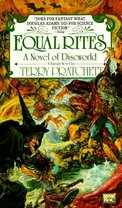
| Series: | Discworld #3 |
| Publisher: | Signet |
| Copyright: | 1987 |
| Printing: | September 1988 |
| ISBN: | 0-451-15704-4 |
| Format: | Mass market |
| Pages: | 254 |
Equal Rites is the third Discworld novel, chronologically, but it departs from Rincewind and Twoflower and starts in a different part of Discworld with entirely different characters. Reading the previous novels first isn't necessary, and indeed this may be a better entry point for the series (although even better ones are upcoming).
A wizard on the brink of death comes to the small town of Bad Ass to pass along his staff and power to the eighth son of an eighth son. This he does with all due gravity and in the nick of time. The problem is, the son is a daughter, and no one has any idea what to make of that.
Eskarina, possessed of significant innate magical power and the old wizard's staff, ends up in the care of Granny Weatherwax, the local village witch. Granny distrusts wizard magic and decides to try to raise her as a witch. In Granny's book, that means learning things, not just having magic, so Esk gets a thorough introduction to herbs and psychology before she gets any training in magic. But Esk's magic isn't going to settle for that, and neither is her staff, so finally they set out for Ankh-Morpork and the Unseen University to try to enroll the first female wizard.
This is fairly obviously following the stock fantasy pattern of a coming of age story, but with twists in gender roles. Granny is the elderly teacher, but she goes for common sense and a relentless practicality rather than the typical mysterious knowledge. She's deeply suspicious of the world beyond the village and rather used to knowing everything she needs to know, but she's good at stepping up to the challenge. Equal Rites is as much her story as it is Esk's. I thought the ending was a touch weak, but I quite enjoyed her reactions to Ankh-Morpork and her practical wisdom.
Esk is one of those rare child characters who never bothered me, mostly because she never does any of the stupid things that writers often feel the need to put their child characters through. She instead is in the self-possessed, precocious mold, with a touch of absolute fearlessness. It helps that her staff is ridiculously powerful and has a mind of its own. The staff is reminiscent of the Luggage from previous Discworld books and was the highlight of the book for me. (I was rather disappointed in the ending; it didn't do the staff justice.)
The play with gender roles is neither subtle nor particularly deep. No one can imagine a female wizard (or a male witch), the male wizards are horribly condescending and smug about it, and of course Esk proves them all wrong through cleverness, friendship, and raw power. Granny's practical lore and the esoteric theories of wizards collide in expected ways (and a great twist on the magical battle from The Sword in the Stone). It's amusing but not particularly remarkable. The best part is Esk's naive native ability, her natural understanding, and the way that leads her to approach problems sideways from everyone else.
This is a better book than either The Colour of Magic or The Light Fantastic, although still not something to rush out and read immediately. It's a fun, fairly fast read if you like Pratchett's humor and puns, although again I thought the ending lacked punch and trailed off in directions that weren't particularly interesting.
Followed by Mort in the chronological sense and (later) by Wyrd Sisters in the plot sense.
Reviewed: 2008-01-05